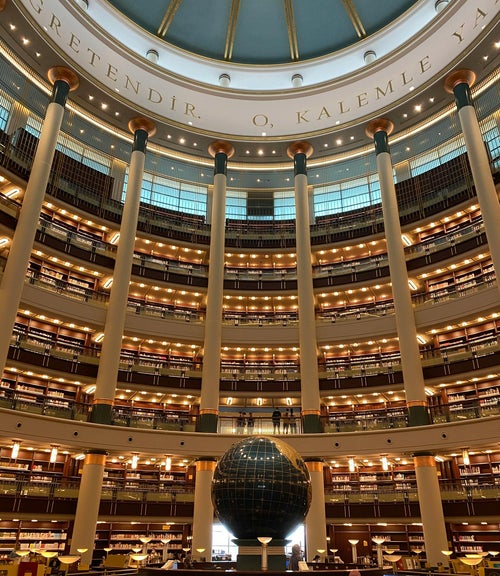Library of Congress
Write About Your Life and See the True You...

The Everyday Archive: Discovering the Power of Reflection Through a Lens of Legacy
The Library of Congress: A Monument to Memory
In a quiet corner of Washington D.C., beneath the weight of marble columns and domed ceilings, exists a place where time pauses and stories breathe. The Library of Congress—vast, intricate, and quietly awe-inspiring—is not merely a repository of knowledge; it is a living testament to what it means to record life, not just in the US but across the world.
Founded on April 24, 1800, by an act of Congress signed by President John Adams, the Library began with just 740 books and three maps. Today, it’s the largest library in the world, housing over 178 million items across 470 languages, including over:
- 25.77 million cataloged books
- 78.5 million manuscripts
- 4.3 million audio recordings
- 1.8 million moving images
- 5.8 million maps
- 15.7 million photographs
- 8.2 million pieces of sheet music
But this building is more than a monument to facts and preservation. It’s a living archive—a sacred container of stories, decisions, identities, and moments. You don’t just step into the Library of Congress to learn something. You step inside to remember that knowledge is meant to be examined, interpreted, and reimagined.
And here’s the quiet truth it illustrates so powerfully:
We’re all walking libraries.
Within each of us is a lifetime’s worth of beliefs, emotions, experiences, and unconscious patterns. But unlike catalogued shelves or marble reading rooms, our inner archives can be harder to access. And the act of Journaling is how we open the doors.
# 📚 **A Library of One: Why Journaling Might Be the Most Valuable Book You’ll Ever Write**
---
---
From Global Archives to Personal Memory: Why Your Story and Journaling Matters
We build grand institutions to protect the thoughts that shape culture. But what protects the thoughts that shape you?
Just as the Library of Congress preserves the voices of nations, your journal can preserve the evolving voice of your own life. The books, photographs, and manuscripts stacked in climate-controlled rooms aren’t so different from the feelings, insights, and patterns stored inside you.
The difference? You get to decide what gets catalogued. And you can start any time. And why -
Journaling Might Be the Most Valuable Book You’ll Ever Write
What Is Journaling, Really?
Journaling is simply reflecting through note*—short entries that capture your thoughts, moods, emotions, reactions, or patterns. When done daily, these reflections begin to stack. They form your own living archive of insight and growth.
You’re not writing a novel. You’re noticing your life before it slips past.
Common reflection notes might include:
- “I felt defensive in that meeting today—why?”
- “I laughed with my friend, but afterward felt strangely guilty.”
- “This evening felt...quiet. In a healing way.”
Over time, these brief entries reveal more than you expect.
What Reflection Uncovers
Journaling doesn’t solve everything. But it reveals what’s happening just below the surface. Here are examples of what it helps you see:
- Emotional Clarity
You feel anxious after family gatherings. When you reflect, you notice it always comes from trying to please everyone.
Benefit: Less confusion. More understanding of emotional patterns.
- Belief Awareness
Compliments make you uncomfortable. Your entries uncover the quiet belief: “I’m not worthy.”
Naming it begins to change it.
Benefit: You spot and reshape limiting beliefs.
Decisive Action
You feel energized after creative work—but drained by admin tasks. Your journal shows a pattern. A career shift begins here.
Benefit: Insight-driven decisions.
Boundary Clarity
Your reflections repeatedly highlight emotional exhaustion after talking to a friend. You didn’t notice this until it showed up on paper.
Benefit: Clearer boundaries. Healthier relationships.
-
From Reflection to Transformation: Why Understanding Changes Everything
Journaling begins with a pen (or smart phone) and a few honest words. It seems small. Maybe even forgettable. But what grows from it is anything but.
When you reflect regularly, you begin to understand patterns—not just as habits, but as messages. You catch beliefs operating in the background. You realize which emotions are asking to be heard. You witness your reactions, not just as behaviors, but as clues.
This understanding is what transforms you.
- Instead of reacting blindly, you - respond with clarity
- Instead of repeating old stories, you - rewrite them with intention
- Instead of avoiding what’s uncomfortable, you - meet it with self-trust
Reflection reveals what’s true for you—not what’s loud, familiar, or expected. And in that truth, you stop surviving and start evolving.
A notebook becomes a mirror. A mirror becomes a doorway.
And eventually, you walk into a life that feels fully chosen.
How to Start (No Pressure, Just Presence)
This isn’t about eloquence. It’s about honesty. Try one of these formats:
- Evening Snapshot: “What moment stayed with me today?”
- Mood Audit: “What feeling kept showing up?”
- Thought Pattern Tracker: “Was there a belief that made decisions harder?”
- Body Check-In: “Where did tension or calm show up physically?”
No need to explain yourself. Just record. You can interpret later.
Begin Your Archive: A Call to Reflect
You don’t need bound volumes or perfect phrases. You need a moment—and a willingness to look inside.
- Write one sentence tonight about how you feel
- Name one thought that lingered
- Capture one observation that helped you pause
Let this be the start of your personal library. One where the author matters just as much as the content. Because this time, you are the story—and the scholar.
So, next time you pass a library—whether grand or tucked into a corner—pause for a moment:
Not to ask what’s inside it. But to ask what’s inside you. Are you recording your life with the same care?
If Not, Maybe Today is the Day to Begin...
Journal Entry: Journaling — Library of Congress
- What story am I telling myself today — and is it true?
- What emotional “volumes” have I written over time — and which ones do I keep rereading?
- What part of me needs a blank page — a chance to begin again?
- What do I avoid writing about — and what might happen if I did?
- If my journal were a library, what section would I visit most — and what’s missing from the shelves?
Affirmations: Journaling — Library of Congress
- “I write to remember, release, and reimagine.”
- “My words are sacred — they hold my truth.”
- “I am the author of my inner archive.”
- “Each page is a step toward clarity.”
- “I honor my story by writing it down.”

Library of Congress
Remember Your Daily
Thoughts and Experiences,
See Life as Truly Is...
For your reference, please find a Good Short Video on The Library of Congress, created by the Library of Congress on YouTube.